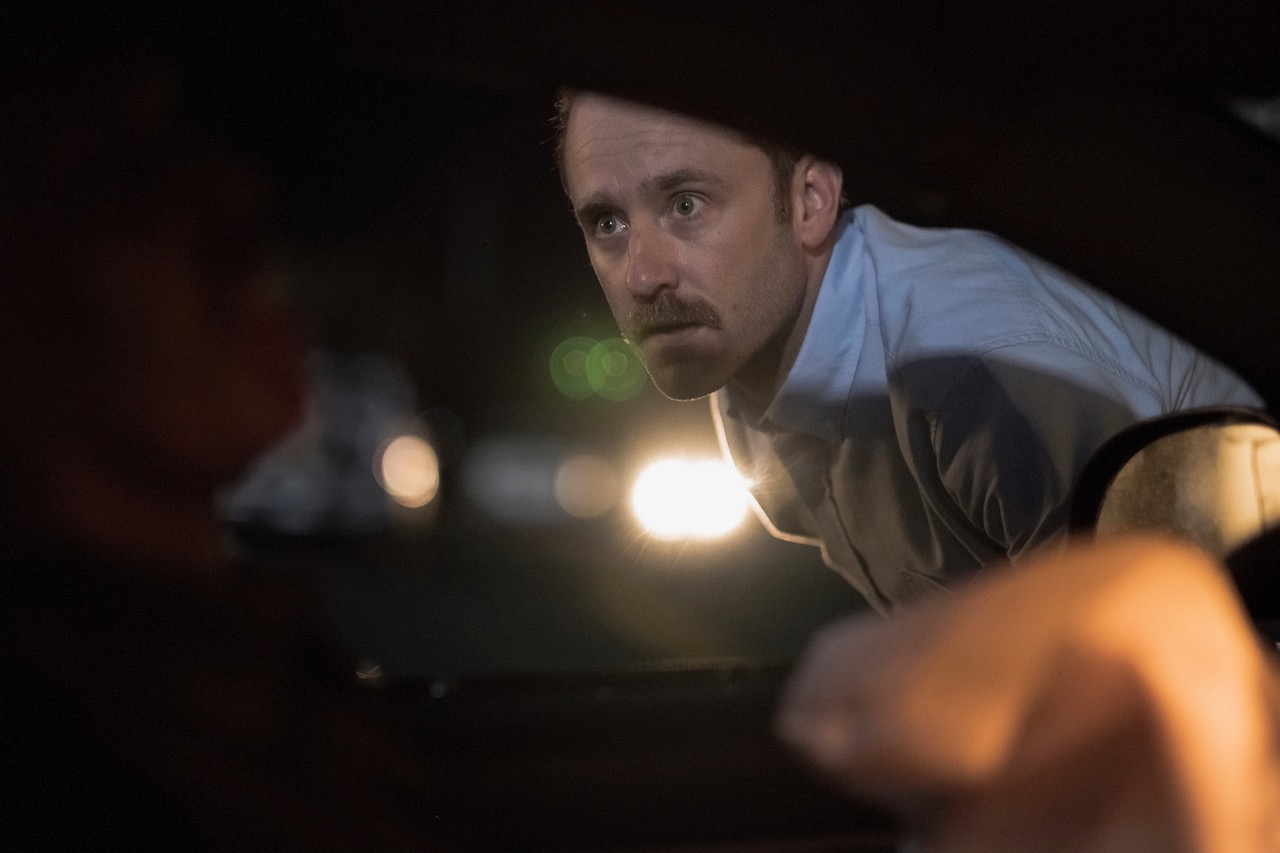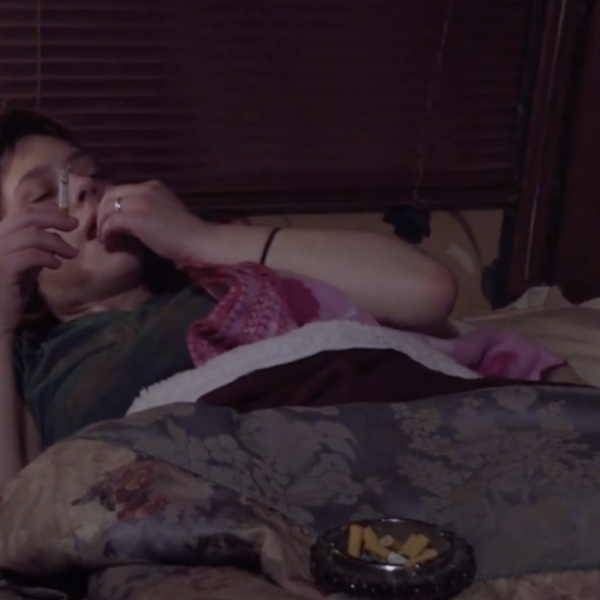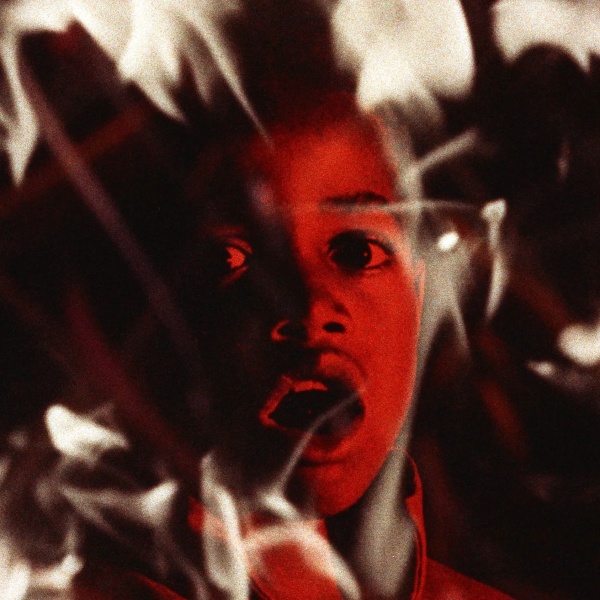The “crisis of masculinity” is the thinkpiece fodder of our time. But because those think pieces tend to skew political or sociocultural, literary and cinematic treatments are often frustratingly on the nose. A middle-aged man who thinks he’s progressive suddenly reveals that he’s not. A guy’s liberal ideals that he holds in the abstract are confronted with some tangible manifestation that upends them. And then there is the whole strain of stories about middle-aged men with various forms of sexual dysfunction.
What’s so thrilling about “Sharp Corner,” Jason Buxton’s atmospheric descent into madness, is how strongly it refuses to explain itself. There are a lot of different readings you could apply here, but there’s still a pervasive novelistic ambiguity that defies any one interpretation.
Josh, played with rich interiority by Ben Foster in one of his best roles to date in an already superlative career, seems to have it all: A loving wife in Rachel (Cobie Smulders), an adorable young son in Max (Will Kosovic), a good job that pays well, and enough financial security for he and Rachel to finally purchase their dream house. Right away, Max calls it “a mansion.” And it basically is: a sprawling, modernist testament to living well with panoramic windows looking out at the rural stretch of road in front of them. A stretch of road that happens to sharply turn at an almost right angle, just dozens of feet away. Their very first night in the home, as Josh and Rachel attempt to have inaugural sex there, a car comes flying off the curve and into their yard, a tire flying through that very window above them. The driver, a high school football star, was killed.
That might give people second thoughts about living in the house from the beginning. But Rachel suggests at first just putting the memory of that traumatic incident behind them and moving on. Josh can’t shake it, though. He awkwardly brings up the accident at a dinner party and offers a toast to the dead driver. He starts Googling the driver at work. Then, another accident happens.
The second time around, Josh becomes even more obsessed, especially since this time, he felt helpless watching this driver bleed out and die while the paramedics took time to arrive. He starts taking CPR classes and buys a creepy mannequin to practice on. His work suffers: Josh had already been passed over for the VP of Sales job, which went to a less experienced employee he had trained himself. Somehow, it’s as if obsessing over these car crashes, and especially the idea of possibly being a hero who can save the people involved in them, fills a hole in his life.
What do you want when you already have everything that society says you should want? The answer to that question can take many forms and often undermines the things that you already have. What validation do you want that can’t be provided by money, security, job title, sex, family, love? Perhaps glory, fame, legacy, being thought of as a hero… more intangible things in life that perhaps speak more directly to the fact that none of us will be here forever. What will outlast us?
Buxton keeps such a tight focus on Josh that it’s easy to find yourself on his journey with him and even empathizing with him. Perhaps because of that singular dedication to exploring his headspace, every other character, with the possible exception of Max, feels a bit underwritten — like the most extreme possible versions of those characters, because that’s how Josh sees them. He loses the love of Rachel startlingly fast. His new boss, the younger guy he trained, sours on him also and claims that the team Josh leads is “barely even a team,” it’s so dysfunctional. Maybe the fact that Buxton never shows us that team’s dysfunction is a reflection of Josh’s own solipsism, his inability to grapple with anything beyond himself. But it does lead to a slight myopia in the film‘s point of view as well. It’s admirable that for much of its running time, “Sharp Corner” doesn’t want to identify good guys and bad guys, but by the sheer amount of time you spend with Josh, it’s hard not to take his side when it feels like his life is completely falling apart and he’s losing everything — even if some of his choices are self-inflicted.
“Sharp Corner” is a riveting, “just go with it” experience, regardless of those shortcomings. The Nova Scotia setting — Buxton is from Nova Scotia himself, and the film has a largely Canadian production team — lends a backdrop of beauty in counterpoint to Josh’s descent. And his dream home represents maybe the most compelling cinematic house since the Park family abode in “Parasite” (which Buxton acknowledges was an influence). Production designer Jennifer Stewart had to design the house from the ground up (it was one of two designs she pitched, the other being a more traditional home), and then Buxton and his producing team had to find just the right stretch of rural road in Nova Scotia that has a curve suitably scary enough. Once that was found and they leased the land around it, they built the house from scratch, functioning like a model home that couldn’t actually be lived in, to serve as external and internal sets (the scenes inside the home were filmed right there, not as a studio recreation). It’s one of the great house “characters” in recent memory, which DP Guy Godfree films in very different ways from start to finish to emphasize the dark place Josh ultimately ends up. As the startling finale begins, Josh is sitting in the now empty home in pitch darkness, himself in silhouette, and Stephen McKeown’s horn-heavy score blares with ominous dread.
This is a deep plunge of a cinematic immersion into a character’s headspace for two hours, and it’s to Foster’s credit that he personally does so little to puff up Josh. There is ultimately nothing heroic about this guy, and feeling bad for him (and ultimately horrified by him) is about as far as your emotional connection with him can go. Why is he the way that he is? It’d take a lot more thinkpieces to get to the bottom of that. What’s gratifying about his “Sharp Corner” is that diagnosing him is less important than just letting him be — and letting him be irreducible. A life is not so easily explained.
Grade: B
“Sharp Corner” world premiered at the 2024 Toronto International Film Festival. It is currently seeking U.S. distribution.
Want to stay up to date on IndieWire’s film reviews and critical thoughts? Subscribe here to our newly launched newsletter, In Review by David Ehrlich, in which our Chief Film Critic and Head Reviews Editor rounds up the best reviews, streaming picks, and offers some new musings, all only available to subscribers.



